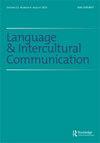Migrants’ NATION-AS-BODY metaphors as expressions of transnational identities
IF 2.2
1区 文学
0 LANGUAGE & LINGUISTICS
引用次数: 1
Abstract
ABSTRACT The metaphors nation-as-body and nation-as-person have been used widely in xenophobic discourses targeting migrants as diseases, taboo body parts or flawed character traits of the body politic. It may then come as a surprise to find such metaphors back in a sample of migrants' responses in a cross-cultural survey of metaphors interpretation, which forms the data of this article. Migrants reinterpret these metaphors to negotiate their fear or criticism of marginalization and praising advantages of mixed identities. These self-validating strategies may be utilized in didactic contexts to counter traditionally discriminatory discourses.移民的“国家-身体”隐喻作为跨国身份的表达
摘要民族作为身体和民族作为人的隐喻在仇外话语中被广泛使用,这些话语将移民视为疾病、禁忌的身体部位或有缺陷的政治体性格特征。在一项关于隐喻解释的跨文化调查中,在移民的反应样本中发现这样的隐喻可能会令人惊讶,这构成了本文的数据。移民重新解释这些隐喻,以协商他们对边缘化的恐惧或批评,并赞扬混合身份的优势。这些自我验证策略可以在教学环境中用来对抗传统的歧视性话语。
本文章由计算机程序翻译,如有差异,请以英文原文为准。
求助全文
约1分钟内获得全文
求助全文
来源期刊

Language and Intercultural Communication
Multiple-
CiteScore
3.00
自引率
47.40%
发文量
50
期刊介绍:
Language & Intercultural Communication promotes an interdisciplinary understanding of the interplay between language and intercultural communication. It therefore welcomes research into intercultural communication, particularly where it explores the importance of linguistic aspects; and research into language, especially the learning of foreign languages, where it explores the importance of intercultural perspectives. The journal is alert to the implications for education, especially higher education, and for language learning and teaching. It is also receptive to research on the frontiers between languages and cultures, and on the implications of linguistic and intercultural issues for the world of work.
 求助内容:
求助内容: 应助结果提醒方式:
应助结果提醒方式:


